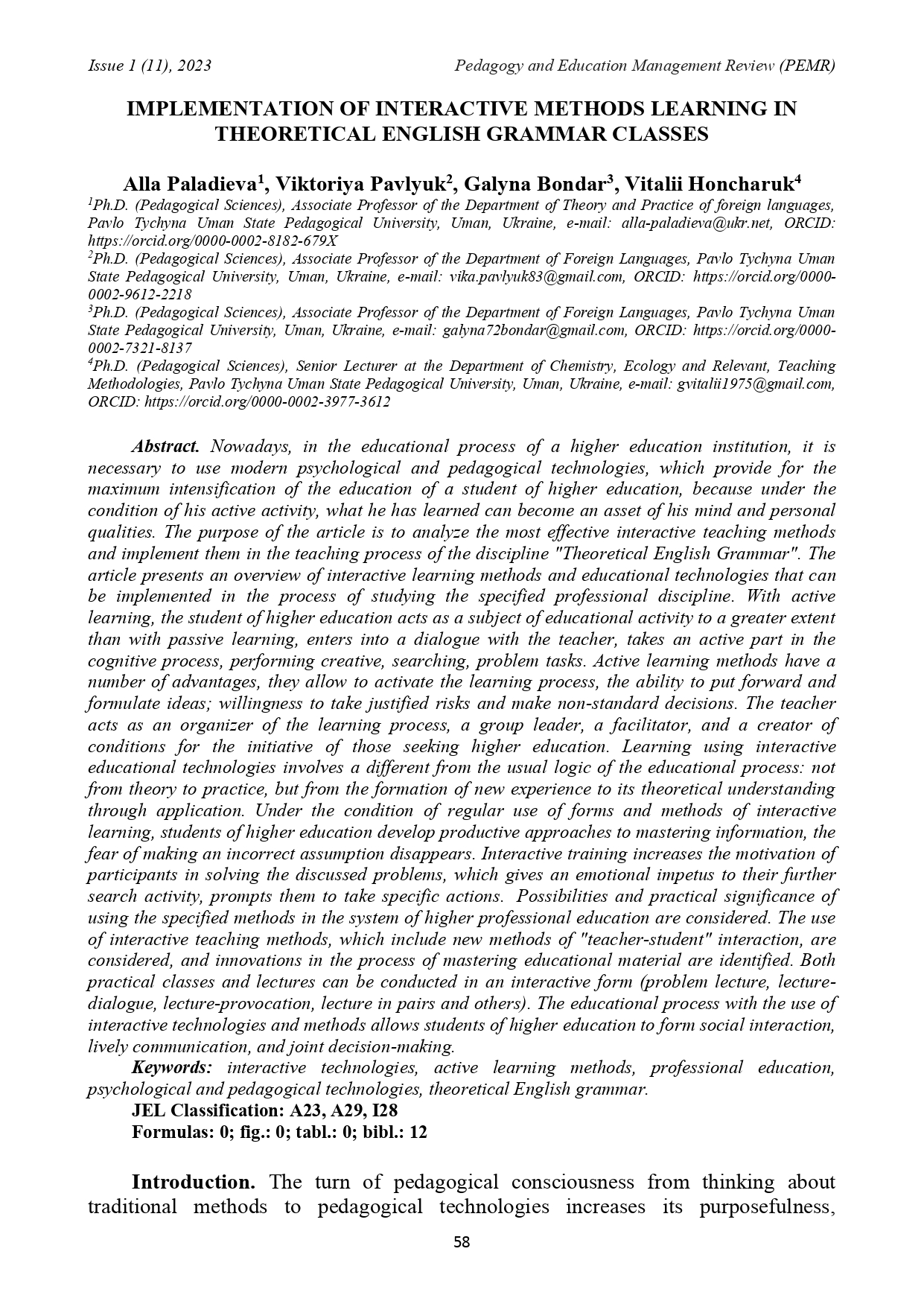IMPLEMENTATION OF INTERACTIVE METHODS LEARNING IN THEORETICAL ENGLISH GRAMMAR CLASSES
DOI:
https://doi.org/10.36690/2733-2039-2023-1-58Keywords:
interactive technologies, active learning methods, professional education, psychological and pedagogical technologies, theoretical English grammarAbstract
Nowadays, in the educational process of a higher education institution, it is necessary to use modern psychological and pedagogical technologies, which provide for the maximum intensification of the education of a student of higher education, because under the condition of his active activity, what he has learned can become an asset of his mind and personal qualities. The purpose of the article is to analyze the most effective interactive teaching methods and implement them in the teaching process of the discipline "Theoretical English Grammar". The article presents an overview of interactive learning methods and educational technologies that can be implemented in the process of studying the specified professional discipline. With active learning, the student of higher education acts as a subject of educational activity to a greater extent than with passive learning, enters into a dialogue with the teacher, takes an active part in the cognitive process, performing creative, searching, problem tasks. Active learning methods have a number of advantages, they allow to activate the learning process, the ability to put forward and formulate ideas; willingness to take justified risks and make non-standard decisions. The teacher acts as an organizer of the learning process, a group leader, a facilitator, and a creator of conditions for the initiative of those seeking higher education. Learning using interactive educational technologies involves a different from the usual logic of the educational process: not from theory to practice, but from the formation of new experience to its theoretical understanding through application. Under the condition of regular use of forms and methods of interactive learning, students of higher education develop productive approaches to mastering information, the fear of making an incorrect assumption disappears. Interactive training increases the motivation of participants in solving the discussed problems, which gives an emotional impetus to their further search activity, prompts them to take specific actions. Possibilities and practical significance of using the specified methods in the system of higher professional education are considered. The use of interactive teaching methods, which include new methods of "teacher-student" interaction, are considered, and innovations in the process of mastering educational material are identified. Both practical classes and lectures can be conducted in an interactive form (problem lecture, lecture-dialogue, lecture-provocation, lecture in pairs and others). The educational process with the use of interactive technologies and methods allows students of higher education to form social interaction, lively communication, and joint decision-making.
Downloads
References
Kharkivska, А., Honcharuk, V., Tyurina, V., Yuldasheva, S., Koval, L. & Poliakova, О. Іntensification of cognitive activity of higher education seekers as a central problem of modern didactics. International Journal of Computer Science and Network Security. Vol. 22, No.1, January, 2022, 161–166. URL: http://paper.ijcsns.org/07_book/202201/20220122.pdf
Olena Fedorenko, Lidia Pletenytska, Kateryna Averina, Valentyna Honcharuk, Larisa Danilevich (2020) The algorithm for applying the rating system of evaluation as an effective method of influencing the activation of cognitive activity of students. Journal of Critical Reviews, 7 (13), 106–108. doi:10.31838/jcr.07.13.17
Zhurat, Y., Honcharuk, V., Zubal, M., Savchenko, N., Dubinka, M., & Yazlovetska, O. (2022). Formation of the Subjectivity of the Future Teacher in the Educational Realities of Ukraine. Revista Romaneasca Pentru Educatie Multidimensionala, 14(2), 434–460. URL: https://doi.org/10.18662/rrem/14.2/589
Honcharuk, V., Pohoda, O., Popovych, S., Fedorenko, O., Filipchuk, N., & Maftyn, L. (2021). The concept of conducting innovative competence of teachers in the space of educational activities. Laplage еm Revista, 7(3), p. 103–110. URL: https://doi.org/10.24115/S2446-62202021731268p.103-110
Honcharuk V. A., Podlevska N. V., Zhyvolup V. I. Profesiina komunikatyvna kompetentnist u systemi fakhovoi pidhotovky maibutnikh filolohiv [Professional communicative competence in the system of professional training of future philologists]. Naukovi zapysky / Red. kol.: V. F. Cherkasov, V. V. Radul, N. S. Savchenko ta in. Vypusk 194. Seriia: Pedahohichni nauky. Kropyvnytskyi: RVV TsDPU im. V. Vynnychenka, 2021. pp. 89–94. DOI: 10.36550/2415-7988-2021-1-194-89-94. URL: https://pednauk.cuspu.edu.ua/index.php/pednauk/article/view/792
Zinchenko, V., Udovychenko, L.,Maksymenko, A., Gevorgian, К., Nesterenko, Т., Honcharuk, V. Aprendizaje basado en proyectos en la formación de futuros filólogos. Revista De La Universidad Del Zulia, 12(35), 2021, 134–147. URL: https://produccioncientificaluz.org/index.php/rluz/article/view/37045/40217
Suchasnyi urok. Interaktyvni tekhnolohii navchannia [Modern lesson. Interactive learning technologies] : nauk.-metod. posibnyk / O. I. Pometun, L. V. Pyrozhenko. Kyiv : A.S.K., 2006.
Nisimchuk, A. S., Padalka, O. S., Shpak, O. T. Suchasni pedahohichni tekhnolohii [Modern pedagogical technologies]. Kyiv, 2000. 368 p.
Kondratiuk, V. L., Volos, M. M., Babyn, I. I. Osnovni tendentsii rozvytku system osvity ta osvitnikh tekhnolohii u svitovii pedahohichnii praktytsi [Main trends in the development of education systems and educational technologies in world pedagogical practice]. Vidkrytyi urok. 2002. № 5. pp. 6.
Fasolia, A. M. Osobystisno-zoriientovane navchannia : dydaktychnyi aspekt [Personal-oriented learning: didactic aspect. Ukrainian language and literature]. Ukrainska mova i literatura. 2003. № 48.
Interaktyvni tekhnolohii navchannia: teoriia, praktyka, dosvid [Interactive learning technologies: theory, practice, experience]: metod. posibnyk / avt.-ukl.: O. Pometun, L. Pyrozhenko. Kyiv : APN, 2002.
Interaktyvni metody navchannia u pidhotovtsi spetsialistiv dlia bankivskoi systemy Ukrainy [Interactive methods of training in the training of specialists for the banking system of Ukraine]: zb. nauk. prats. Sumy – Kharkiv, 2001. 250 p.







